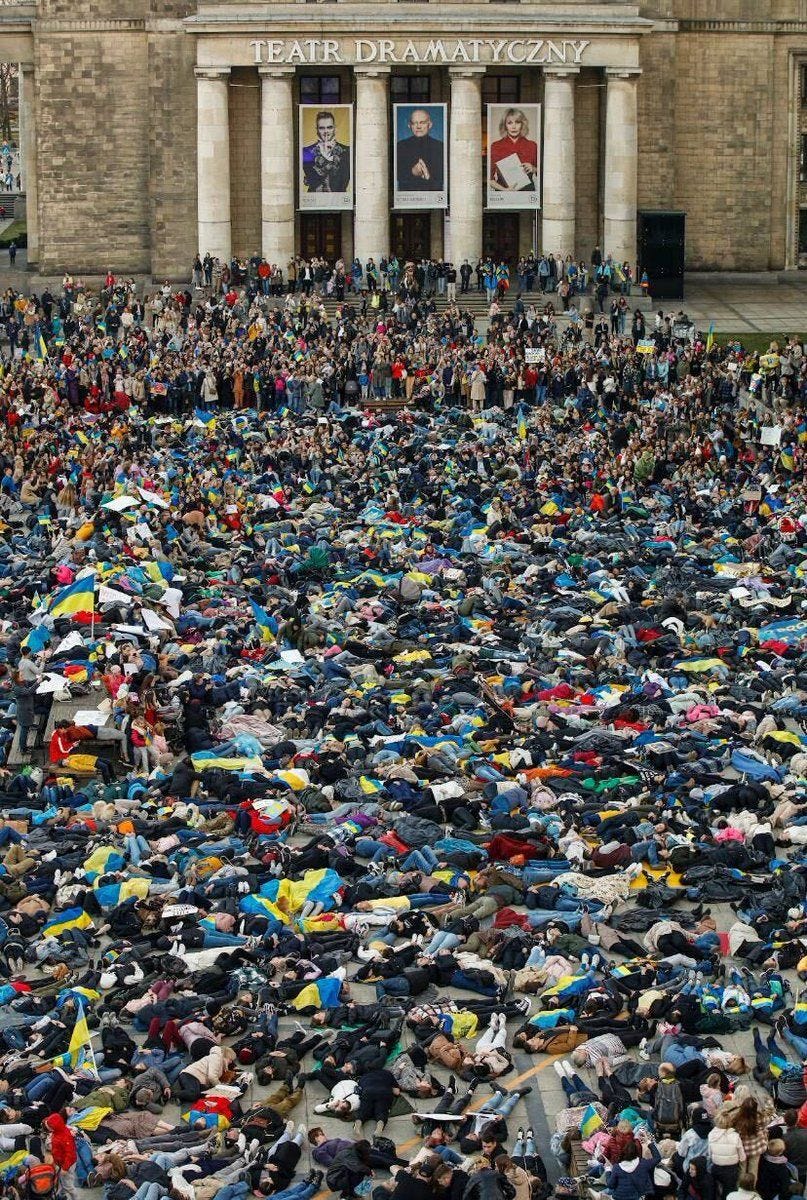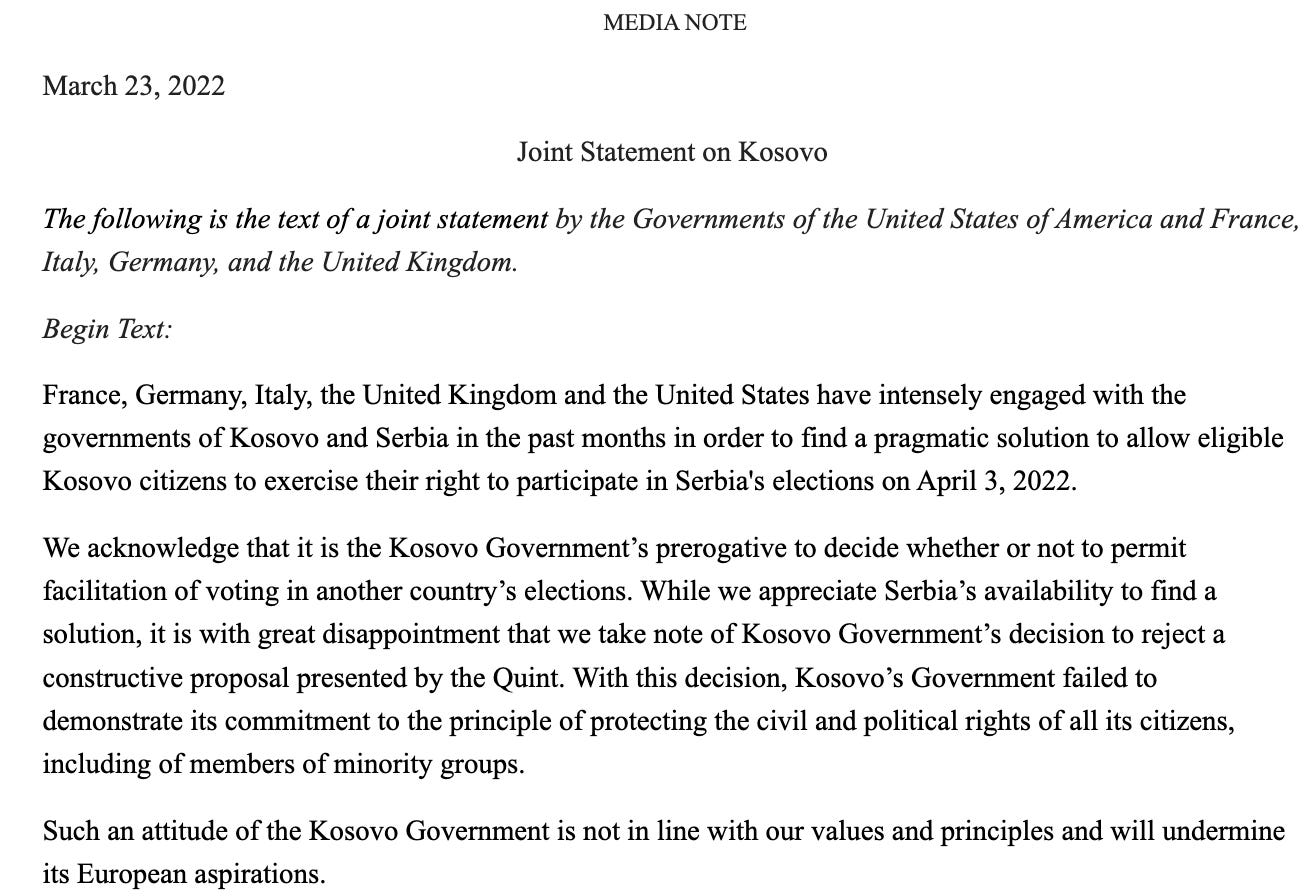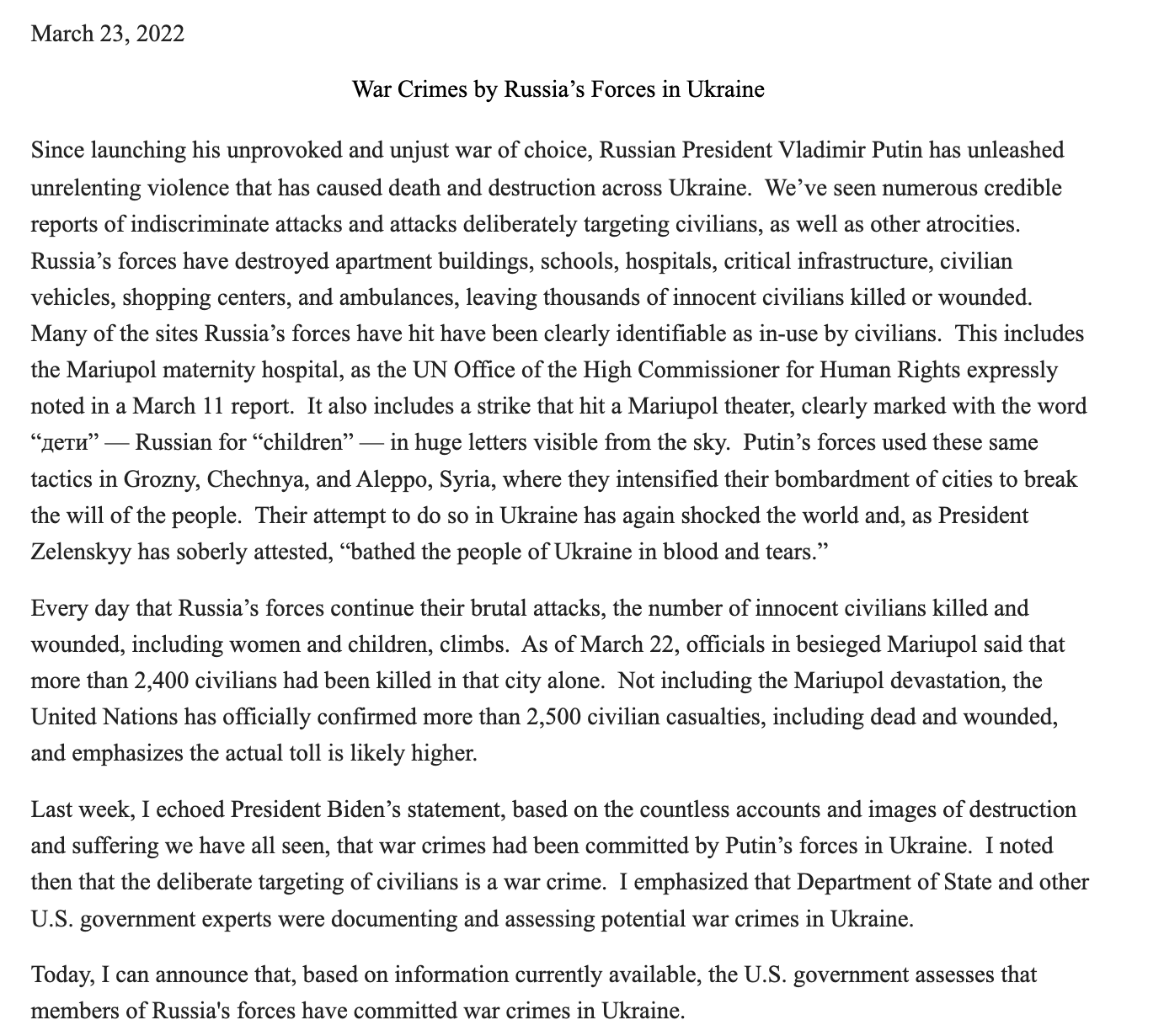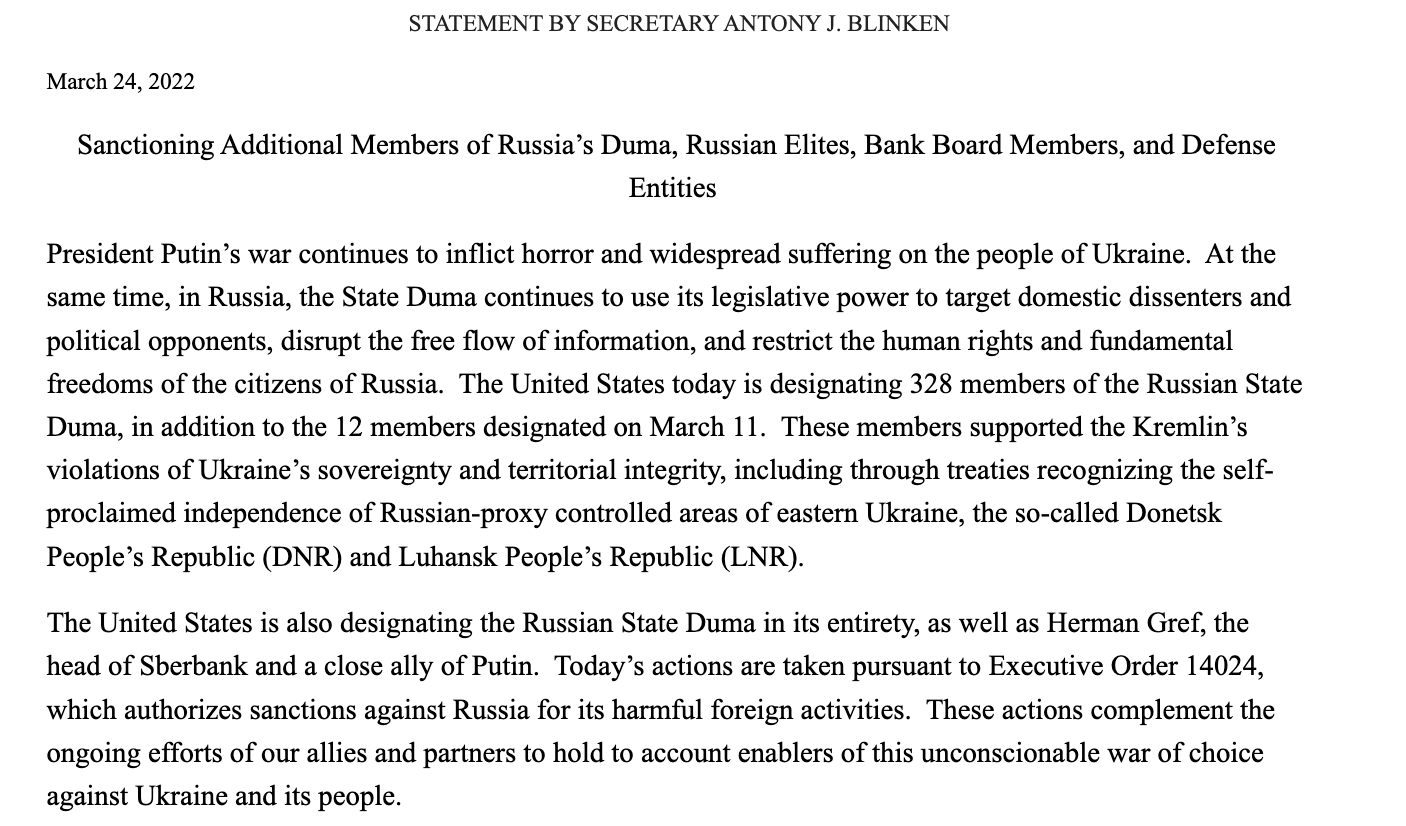Vladimir Putin talks cancel culture.
Vladimir Putin orders his soldiers to kill innocent civilians in Ukraine while talking about cancel culture. People are launching new magazines to get clicks by being contrarian. Worrying things are happening in Ethiopia and North Korea and Myanmar, and many other places.
You have the right to log off of the Internet. The world is kind of garbage right now. Take care of yourselves. Go on a walk outside. Donate some money to Ukrainian refugees if you can. Read real news and ignore the disinformation. Don't respond to that terrible hot take on Twitter. That is all I have to say this week.
Happy weekend,
Cristina
P.S. CNBC has a good list of the top-rated charities you can donate to if you can afford to help Ukrainians right now. This group of Polish volunteers is taking care of animals rescued from Ukraine. VICE wrote an article about them that I linked to below.
What I'm writing:
• I wrote about the debate in Congress over how to help Ukraine impose its own no-fly zone over the country and what that would entail. In recent days, the Russian and Ukrainian air forces have stepped up their battle for the sky, making the matter even more urgent. [This story is unlocked].
• I spoke to Ukrainians mobilizing to fight the information war. They’re coming up with creative ways to target Russian-speaking audiences with the truth, including using social media ads and comments to get around Russian censorship.
• I spoke to Julie Mason on SiriusXM on Friday morning about Russian disinformation, the potential use of chemical weapons in the war in Ukraine, and other things related to my reporting.
What I'm reading:

• Ukrainian President Volodymyr Zelenskyy said that any compromises reached to end the Russian invasion of Ukraine would need to be approved by the Ukrainian people in a referendum, the Washington Post reports.
• The U.K. government said the Russian mercenary company Wagner Group is being used to try to assassinate Ukrainian President Volodymyr Zelensky, the Wall Street Journal reports.
• Residents of the Ukrainian city of Mariupol are being taken to Russia against their will by Russian forces, CNN reports.
• Russia plans to unleash a “great terror” on the southern occupied city of Kherson by kidnapping residents and taking them across the Russian border, an FSB whistleblower told the Times.
• Russian attacks are endangering Ukraine’s world-leading medicinal chemistry industry, which supplies scientists across the globe with the molecular building blocks needed for early drug development, the Wall Street Journal reports.
• Russian troops seized a land corridor with the Crimean peninsula, blocking Ukraine’s access to the Sea of Azov, the BBC reports.
• Russia’s anti-Ukraine propaganda has become part of lessons in Russian schools for students as young as kindergarten, the Washington Post reports.
• The war is entering a new phase — a grueling longer-term war of attrition and a new, difficult test for the Ukrainian military and the nation, Ilia Ponomerenko reports for the Kyiv Independent.
• Russia announced that it would halt negotiations with Japan on a post-World War II peace treaty in response to Tokyo’s sanctions over the war in Ukraine, the Washington Post reports.
•The U.S. is sending Ukraine's military some of the Soviet-made air defense equipment the U.S. secretly acquired decades ago, the Wall Street Journal reports.
• Russia's Deputy Foreign Minister Igor Morgulov met with North Korea’s ambassador to Russia to discuss developing bilateral relations “in the context of changes happening on the international arena,” Reuters reports.
• The Moscow Times has a report demonstrating the depths of Kremlin propaganda at the funeral of a 21-year-old killed in Russia's war on Ukraine. “He fought against evil, Satanic spirits: Ukrainian Nazis, created by American multinational corporations," the priest began.
• A Russian court sentenced opposition leader Alexei Navalny to nine years in a maximum-security prison after finding him guilty on fraud charges, Politico Europe reports.
• Polish volunteers are risking their lives to save abandoned pets in Ukraine, VICE reports.
• Poland expelled 45 Russian diplomats it accused of being spies, the Country’s Minister of the Interior, Mariusz Kaminski, said on Twitter.
• As Poland plays a crucial role in the West's response to the war in Ukraine, a group of MEPs is urging the EU Commission not to release funds for Poland under the NextGenerationEU initiative until Warsaw deals with its rule of law breaches.
• The European Union is preparing a policy called "the Strategic Compass" that would allow it to deploy up to 5,000 troops in a crisis.
• Politico Europe has a report on how Greeks are responding to their government's decision to support Ukraine. Russophile sentiments remain in parts of Greece, given the centuries of religious, military, economic, and cultural ties between the two countries.
• Greek Foreign Minister Nikos Dendias announced plans to personally deliver a shipment of humanitarian aid to Mariupol, a city with a significant ethnic Greek population, the Washington Post reports.
• Turkish President Recap Tayyip Erdogan, who is soon expected to meet with Russian President Vladimir Putin, said he would urge Putin to make an “honorable exit” from Ukraine by becoming an “architect” of a peace deal with Kyiv, the Financial Times reports.
• Politico Europe also has a report on Russian influence in Bulgaria. The new Prime Minister Kiril Petkov has to navigate a complex history of ties to Moscow and has already fired his defense minister.
• Hackers attacked the Croatian Daily Slobodna Dalmacija and posted Kremlin propaganda, Balkan Insight reports.
• Estonia is similarly fighting back against Russian propaganda, which is trying to sway the country's 300,000 Russian speakers using anti-Ukrainian sentiment, Politico Europe reports. The Kremlin has saturated state-backed Russian-language television news broadcasts — widely available in Estonia — with anti-Ukraine propaganda since 2014.
• The Balkan Investigative Reporting Network discovered a pyramid scheme deceiving desperate Burundians into paying thousands of euros for the false guarantee of entry to Serbia and eventual asylum.
• Bulgaria’s former Prime Minister Boyko Borissov was released 24 hours after being detained in connection with investigations by the European Public Prosecutor’s Office (EPPO), Politico Europe reports.
• The Israeli government rejected requests from Ukraine and Estonia in recent years to purchase the Pegasus spyware tool out of fear of damaging Israel’s relationship with the Kremlin, the New York Times reports.
• Morocco reinstated its ambassador to Spain, effectively ending a 10-month row between the two neighbors after Madrid shifted its long-standing position on Western Sahara, its former colony in North Africa, the Associated Press reports. But now Algeria is mad that Spain sided with Morocco, Euronews reports.
• Sweden and Finland are participating in NATO military exercises this week, despite neither being a member of the military alliance, NBC News reports.
• Jailed Corsican nationalist Yvan Colonna died after falling into a coma following an attack by a fellow inmate, Reuters reports.
• Judge Erika Aifán, one of Guatemala’s most influential judges and a key U.S. ally in the fight against corruption, resigned and fled the country, the Washington Post reported.
• The Brazilian Supreme Court withdrew an order to suspend the messaging app Telegram in Brazil after the company complied with directives to block accounts used by Brazilian President Jair Bolsonaro’s supporters to spread false information, the New York Times reports.
• The Biden administration formally determined that violence committed against the Rohingya minority by Myanmar’s military amounts to genocide and crimes against humanity, Reuters reports.
• Religion-fueled mob violence is on the rise in Pakistan, as demonstrated by a recent lynching of a man accused of burning pages from the Quran, the New York Times reports.
• Pakistani Prime Minister Imran Khan said he would not resign despite calls from the opposition for him to step down ahead of a no-confidence motion against him, Reuters reports.
• The Syrian regime is setting up a maze of shell companies in a systematic attempt to avoid sanctions, according to official documents obtained by the Guardian.
• Saudi Arabia said it could not be held responsible for global oil supply shortages after Yemen’s Houthi rebels struck Saudi energy facilities in at least three cities, the Washington Post reports.
• Only about half a million out of nearly 12 million Tunisians participated in a two-month online consultation on shaping the country’s new constitution, the New York Times reports.
• Elon Musk’s ties to China are causing unease in Washington, including among Republican lawmakers who have previously been strong supporters of the billionaire entrepreneur, the Wall Street Journal reports.
• China has fully militarized at least three of several islands it built in the disputed South China Sea, the Associated Press reports.
• North Korea launched its first intercontinental ballistic missile since 2017, dramatically escalating tensions with the U.S., the New York Times reports.
• Ethiopia’s government announced an immediate “humanitarian truce” with forces it has been fighting for 17 months in the northern Tigray region, the New York Times reports.
• Ukrainians fleeing the war for the United States are running into a lot of red tape, Susie Armitage reports for the Guardian.
What the State Department says:
If you enjoy this newsletter, please share it with a friend, share a link on social media, or upgrade to a premium subscription for $2 a month if you can afford it. And please don't hesitate to get in touch with recommendations for what I should feature here: c.maza@protonmail.com.
Upgrade to a premium subscription by Clicking Here








